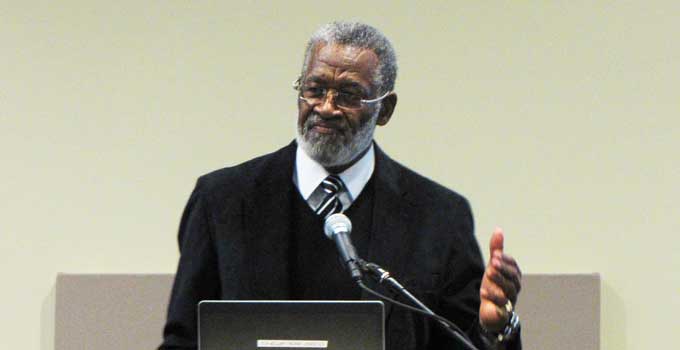 As the first black man to buy a house in Overland Park in the Jim Crow days, he had to fight for it, said Bobby Bell Sr., 73.
As the first black man to buy a house in Overland Park in the Jim Crow days, he had to fight for it, said Bobby Bell Sr., 73.
The retired Kansas City Chiefs star and hall of famer told his story today at a hate crimes conference at UMKC.
He was from Shelby, North Carolina, where at age 13 he worked in a barbeque restaurant where he was not allowed to eat.
Years later, he returned to that town as a famous All American college football player and still had to ask for special permission to eat at an ice cream shop.
“I’ve seen it, done it, been through it – it wasn’t an easy trail,” he said.
In his youth, blacks could not attend or play football at the state college in North Carolina.
But a coach there saw him play and recommended him to a coach at the University of Minnesota, which had a few scholarships available for black students.
He played quarterback there at first and then the coach shifted him to offensive tackle.
“I went from ball handling to man handling just like that,” he said. Bell became a big star and the Minnesota team won a national title.
He won awards and went on the Johnny Carson show and others.
“Shelby gave me a key to the city,” he said, and had a parade for him and he got to make a speech.
“I said I would love to go across the street and walk into the ice cream place though the front door and get me a cone of ice cream,” he said.
The whites gasped but then said he was one of them now, he said. “They separated me from my black brothers.”
In 1962, he went to Kansas City to play for the Chiefs.
“I wanted to make Kansas City my home,” he said. “It was hard for me to get a house here.”
He was finally set to buy one in Overland Park but the bank refused a loan on it without saying why.
The developer said he would rent it to Bell until a loan was worked out, Bell said.
“By him selling me the house, they blacklisted him – he could not build homes there anymore,” Bell said.
Bell finally got a loan and bought the house, he said, and a kid handed him a flyer on the street.
It told about a neighborhood meeting and he went to it. When he walked in, they told him the meeting was cancelled.
“It was about me, it was about the neighborhood going downhill,” he said.
He put in the first swimming pool in that neighborhood, he said. His original next-door neighbor still lives there and called him a few years back when Bell’s old house was up for sale, Bell said.
“He wanted me to come back and buy the house,” he said.
Racism still exists, he said, and still has to be fought.
Tammy Dickinson, U.S. attorney in Kansas City, said, “We’ve come a long way in the past decades, …but we have a very long way to go to stamp out all forms of bigotry.”



Who’s talking